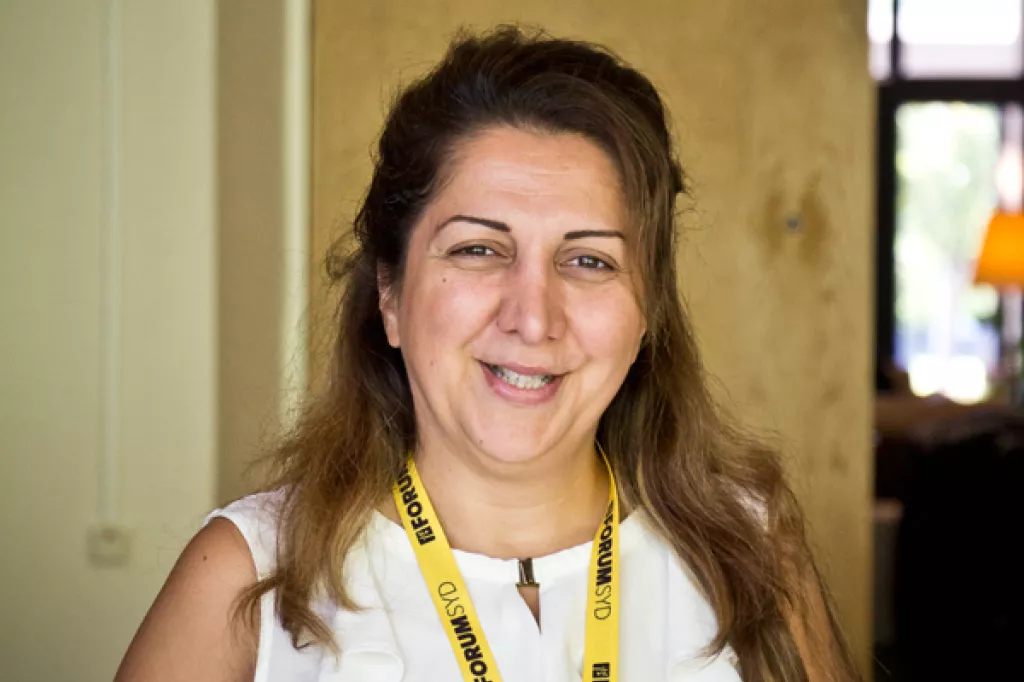”You have a husband and children, how can you then be a feminist?”

She has just ended a three day long conference Stockholm4EaP, hosted by Forum Syd, where civil society has given input on reform needs in Eastern Europe.
To be a feminist is associated with someone who hates men. Therefore, if you are a feminist it makes no sense for you to be married. Society in Azerbaijan is very family structured and arranged marriages are common. The parents decide over a daughter’s life up until she is married, then the husband’s family take over the responsibility. Gender stereotypes are deeply rooted in our society and the family strongly regulates female behavior. The situation of gender relations has big variances depending on rural or urban context. Women in Baku are more self-determined and engaged in public life compared to remote villages, where strong patriarchal traditional norms still limits participation of women.
Pervana’s participation at the conference is to see that recommended reforms, be they about environment, education, energy, infrastructure or public service, also benefits women. She feels that gender inclusion and budgeting became a red thread at the conference regardless of reform topic.
- I have hope for the outcomes of this conference. These recommendations are taken to the European Union which can enable commitment from our government. We will work together with other gender organizations for the commitments to be realized. The government will thus be pressured from below and internationally in order to create change for women.
The Azerbaijan government can’t be said to take women’s rights seriously according to Pervana. As an example, in 2006 the State Committee on Women’s Issues was renamed as the “State Committee on Family, Women and Children’s Affairs which is the government body responsible for the implementation and regulating policies on women issues.
- The name of the institution indicates women’s position in society and affirms the traditional social division of labour – the role and the place of the women unfortunately is at home with her family. This could also be considered as indication that the state regards women as vulnerable ‘reproductive units’ who should be protected.
After years of lobbying legislation “Law on Prevention of Domestic Violence” was adopted in 2010. It was an important step towards the protection of women. However, its implementation is weak due to lack of mechanisms to uphold it. The majority of women are still not aware of its existence and women hesitate to contact any governmental institutions in cases of domestic violence.
- There is an Azerbaijani proverb that goes ‘Trash is not taken out of the house’ – which is to say that family problems are family business which includes conflicts and domestic abuses that should be kept within the family. Together with the sense of what happens in the family, stays in the family makes statistics on gender based violence a complete headache.
Pervana wish to see public service delivery designed to offload women’s burden in the home. How infrastructure see to enable movement and service access for rural women. How educational investments encourage women to attend higher education and to use their diplomas at the labour market, rather than as a dowry for their marriage and future lives as housewives. How environment and energy developments must reduce emissions and pollutions which adds to the burden of care and agricultural production for women.
The compiled recommendations, formulated by civil society during the Stockholm4EaP conference, will be presented by the ambassador for all Eastern Partnership and used as an advocacy tool during the EaP Heads of State Summit. The summit will include heads of states from Armenia, Azerbaijan, Belarus, Georgia, Moldova and Ukraine. Gender perspectives have been included in all reform recommendations.
Pervana and her colleagues will continue their every day’s work for girls and women’s rights in Azerbaijan. The local pressure together with EU commitments forms a two front attempt to enable and protect human rights in Azerbaijan.
Andra nyheter

The power of people powered Public-Private Partnerships
Public–Private Partnerships (PPPs) are often discussed in terms of roads, power plants, housing, and other large infrastructure projects. But as discussed on the People’s Partnership Podcast, PPPs are...

ForumCiv’s social media accounts labelled as “extremist materials” in Belarus
Important message to our Belarusian followers. Any interaction with our content can now lead to legal consequences in Belarus. Please read the information below and take the necessary precautions for...

ForumCiv enters new strategic partnership
ForumCiv is proud to announce a new three-year strategic partnership with Sida, totalling SEK 137 million.